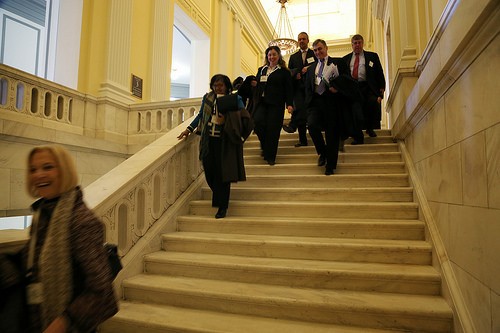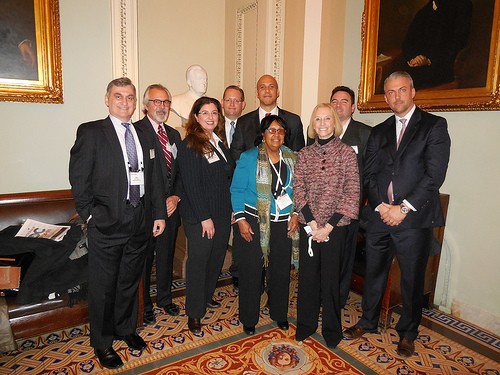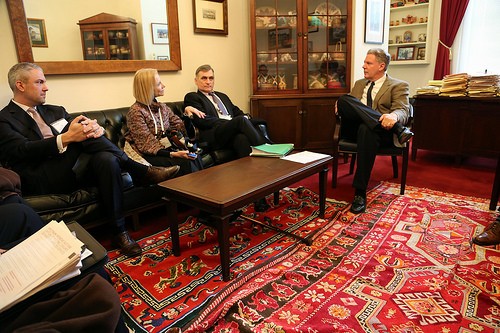NJ Tech Companies Tell Congress About Their Concerns During NJTC Tech Trek

On Feb. 11 and 12, 2014, the New Jersey Tech Council (NJTC) made its annual Tech Trek to Washington, D.C. During that trip, which they made jointly with the industry organizations TechVoice, CompTIA (Computing Technology Industry Association) and TECNA (Technology Councils of North America), council members got a chance to learn about issues affecting small and midsize tech companies. They were also able to lobby members of Congress and senators from N.J. directly for help with those matters.
This year, Michelle Capezza, an employee benefits attorney with the law firm Epstein Becker Green (New York and Newark) who is a designated NJTC ambassador, accompanied the group to Washington. She wrote about the issues discussed with Congress in the firm’s Technology Company Counselor blog. The entire post can be found here.
The NJTC delegation was led by Maxine Ballen (NJTC president and CEO) and Paul Frank (NJTC vice president of membership), who secured additional meetings with many New Jersey representatives.
Capezza participated in group meetings with Senator Cory Booker, Senator Robert Menendez, Congressman Frank Pallone, Congressman Leonard Lance and staff for Congressman Donald Payne Jr. and Congressman Jon Runyan.
NJTechWeekly.com is publishing the following edited excerpt from Capezza’s blog post to give our readers an idea of some of the issues that will affect the N.J. tech community in the coming months:
Data breach notification legislation. Currently there is no national standard for how a company must notify its customers about a data breach. Instead, companies must navigate a web of 47 different and often conflicting state data breach notification laws. The advocates [representatives of the tech industry] championed policies that include setting a national standard for data breach and notification that would preempt the various state laws on these issues. This standard would provide appropriate exemptions for companies complying with other applicable laws on these issues and those that use encryptions or technologies that render data unusable.
The advocates asked for the development of reasonableness standards and centralized government enforcement regarding data breach issues. Moreover, they requested passage of privacy legislation that balances small and medium-sized businesses’ need to collect data to improve customer experience with consumer-friendly privacy and security policies.

New/emerging technology platforms and patent reform. Many new public policy considerations result from advancements in cloud computing, mobility, machine-to-machine (M2M) technology, unified communications platforms and various Internet-based applications. The group supported releasing a greater quantity — and larger blocks — of unlicensed wireless spectrum, nurturing appropriate advancements in smart M2M technology and promoting the responsible use and leveraging of big data to spur innovation and economic growth. It also lobbied for supporting limited, technology-neutral digital policies and educating policymakers in the need for best practices regarding mobility devices and applications.
On a related note, the advocates discussed several recent patent-reform legislative proposals that have been championed by members of the House and the Senate, and they remain hopeful that the Senate will consider the Innovation Act (H.R. 3309), passed by the House last year. Even though the America Invents Act was passed in 2011 to address the quality of patents awarded, patent assertion entities (PAEs), or patent trolls, continue to be a significant problem for small and medium-sized businesses, and this issue must be addressed.
Priorities include passing patent reform to reduce abusive patent infringement litigation, which would curb costs and protect technology innovators, require various disclosures and more transparency concerning demand letters and protect end users from abusive patent claims by allowing for the stay of cases against downstream customers.

Workforce, education and immigration reform. According to Burning Glass Technologies Labor/Insight, there were at least 600,000 open IT and IT-related jobs in the U.S. in 2013. Creating a sustainable IT workforce was recognized as critical to U.S. global competitiveness.
Further, recognizing that small and medium-sized IT firms account for more than $100 billion in payroll and more than 2 million jobs, the advocates championed tax reform policies that would encourage business growth (including enacting tax code benefits and credits that help the technology industry, such as Section 179, small business expensing). The R&D tax credit for investment in technology research (which could allow small startup firms and pass-through investors to offset the credit against payroll tax liability) was also discussed.
However, as businesses continue to emerge and expand, it is critical to attract high-skilled workers to meet the growing demand for these jobs. The advocates stressed the need for policies that encourage lifelong education in computer science. Moreover, policies that foster the development of IT skills promote a skilled workforce, which can increase both job growth and our nation’s ability to compete globally. In this vein, the tech council representatives stressed the need to improve the America Works Act, the Workforce Investment Act and No Child Left Behind and to enact high-skilled worker immigration reform (particularly as it relates to new visas for STEM graduates).
Given that education reform will take years to have an impact, immediate immigration reform is needed to ensure that high-skilled workers, including foreign-born, U.S.-educated students and entrepreneurs, can obtain visas to fill current job openings. Several proposals in Congress must balance border security with legalization and family and work visas, and it is likely that immigration will be addressed piece by piece.

